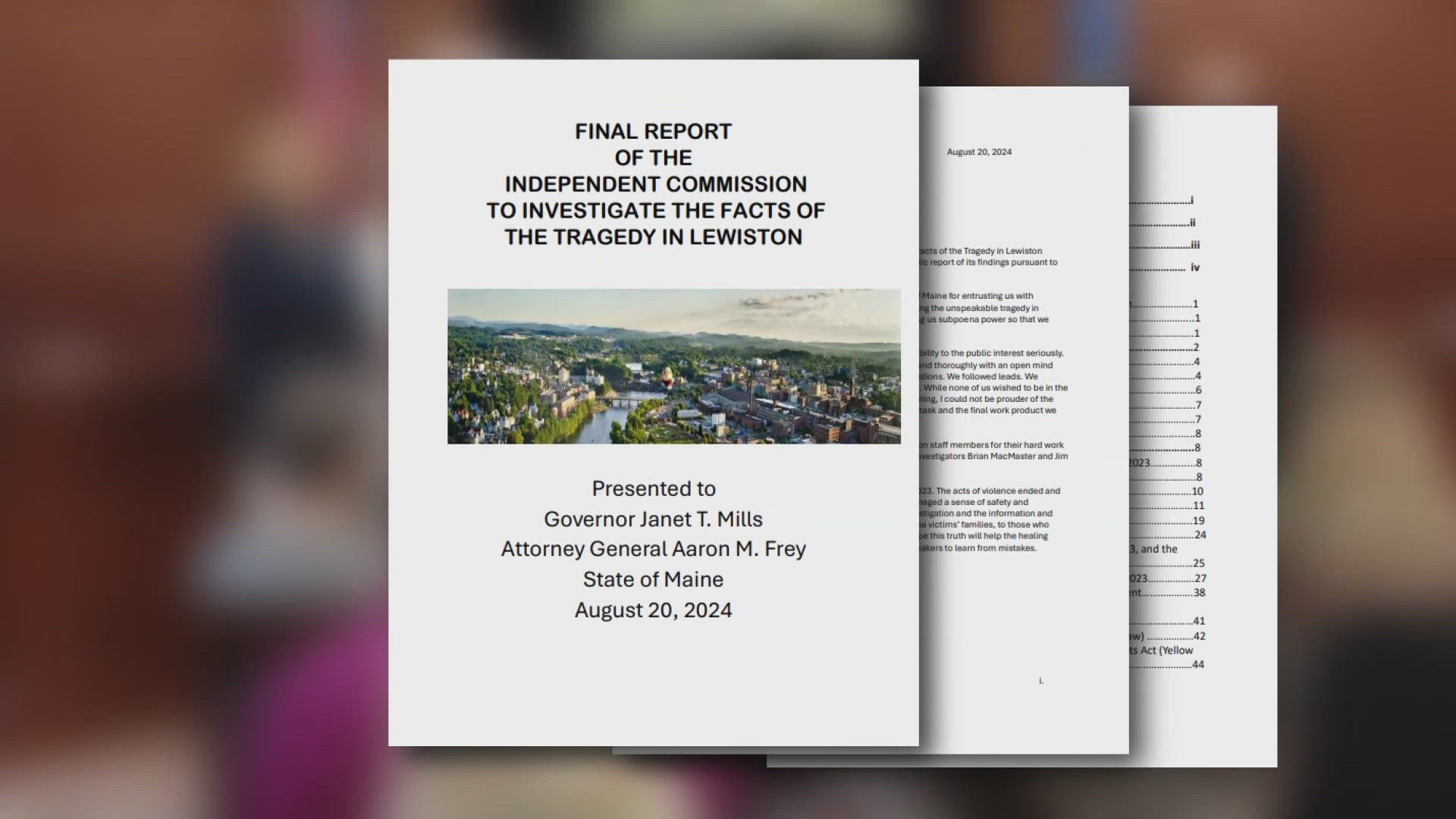LEWISTON, Maine — Outlined in a detailed report released Tuesday, facts from an independent commission tasked with investigating the facts of the Lewiston tragedy reveal several steps were not taken that might have prevented the mass shootings on Oct. 25, 2023, when 18 people were killed.
Commission Chair Daniel E. Walthen discussed the 215-page document along with his dedication to the victims and survivors of the shootings.
"Surely everyone here wishes we [could] go back and change what happened in the months, weeks, and days, and minutes leading up to the tragedy," Wathen said, "We can't. However, we can look forward."
The independent commission held 16 public meetings and heard from several witnesses and survivors regarding the days leading up to and following the shootings, all of which were taken into account in the report.
Megan Vozella, the wife of Stephen Vozella who died at Schemengees Bar & Grille, and shooting survivor Richard Morlock were at Tuesday's meeting with their attorneys, Ben Gideon and Travis Brennan.
Vozella and Morlock, both members of the deaf community, testified before the commission earlier this year, sharing their experiences the night of Oct. 25 and the grief that has come since.
“We’ve gone through a lot of broken pieces. It’s like we’re walking through the shards one step at a time, one day at a time, and still attempting to enjoy our lives, because life is short, clearly," Vozella said outside of Lewiston City Hall Tuesday afternoon.
Gideon and Brennan are representing 90 survivors and victims' families. The pair said they would be taking steps toward civil lawsuits over the next few months to hold the people and organizations who crossed paths with gunman Robert Card leading up to Oct. 25 accountable.
"The commission unanimously finds that there were several opportunities that, if taken, might have changed the course of these tragic events," Wathen said.
Starting in May of 2023, Card's family members and friends in the Army Reserve raised concerns regarding Card's "paranoid" behavior and eventually alerted leaders within the Army Reserve and the Sagadahoc County Sheriff's Office.
The report faults the Army Reserve for failing to follow up with Card's decline in mental health after his treatment at a New York hospital and also the Sagadahoc County Sheriff's Office for failing to trigger Maine's yellow flag law following sufficient "probable cause" to do so.
"Despite their knowledge, [Army Reserve leaders] ignored strong recommendation of Card's mental health providers, to stay engaged with his care," Wathen said.
“What is absolutely striking is that although everyone was scared about his actions while he was on duty, he was then permitted to walk out of the hospital into the community with no protections, no follow up for the community," Brennan said outside city hall. "That left the community absolutely exposed.”
The report also highlights law enforcement's response in the hours following the mass shootings, noting the bravery many officers showed. However, the commission acknowledges the "utter chaos" as officers responded throughout the two days of the manhunt for Card.
No formal recommendations given in the report, which the commissioners stressed was not what they were tasked to do, but members said they hoped the officials involved will read it and take the right steps to prevent another situation like this from happening.
Morlock said he was playing cornhole at Schemengees Bar & Grille with his friends when he suddenly heard gunfire. He testified to the commission in March that he laid on the floor and pretended to be dead to avoid being shot.
"Those of us who survived have a new kind of group, but it’s still extremely difficult. What a sad group to be a member of," Morlock said.
He said he lost four close friends that night.
"Our caring and love for them will never stop. Our love for them is immense," Morlock said.

